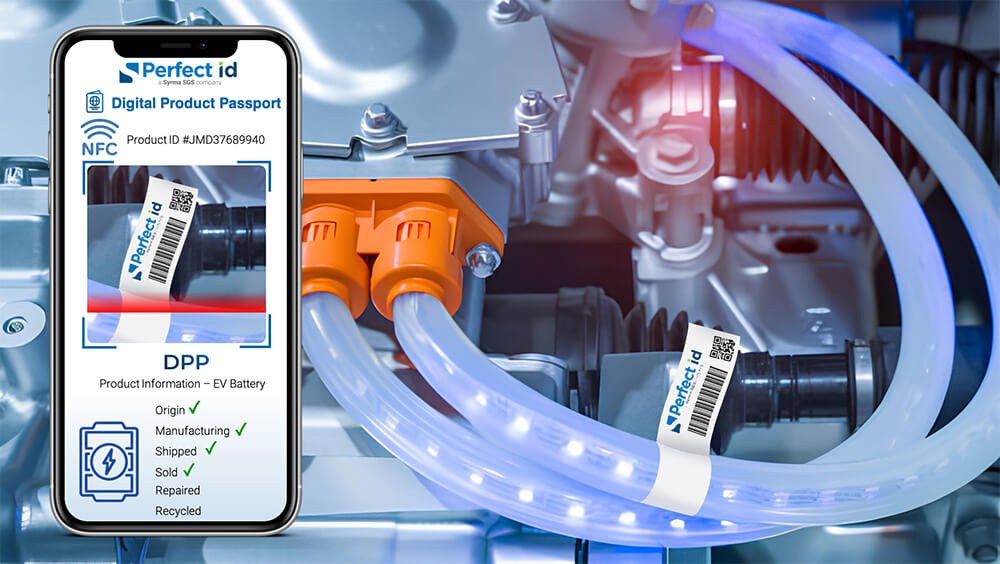
For more information, please contact us at info@syrmatech.de or via our contact form.
Read also: Miniaturized RFID tags for the Digital Product Passport (DPP)
What is a Digital Product Passport?
The European Commission has launched several legislative proposals to improve the sustainability and environmental performance of supply chains and operations in key sectors. The Commission's goal is to achieve a fully circular economy in the EU by 2050. To achieve this, several technological and operational requirements will be imposed on companies that wish to continue selling physical goods on the European market. Several key industries were among the first to be affected by this new legislation, including textiles, batteries, and electronics/ICT.
In the coming years, most products sold in the EU—from tires and construction materials to clothing and detergents—will be required to bear a label containing detailed information about the materials used, manufacturing processes, and recyclability. By revealing a product's journey and environmental impact, the Digital Product Passport will empower consumers to make informed purchasing decisions and pave the way for a greener, more ethical future. This fundamental framework is expected to form the information backbone of the global circular economy.
At its core, a Digital Product Passport is a digital record containing important information about a product's composition, origin, and life cycle. It can be thought of as a product's official "paperwork" that accompanies it from manufacture to purchase to disposal. Under this upcoming legislation, companies selling products in Europe will be required to collect and share detailed data on an item's verified sustainability credentials.
European manufacturers, retailers, and those exporting products to the EU can provide this Digital Product Passport by attaching a physical "data carrier" to their products. While the initiators of the DPP have not yet specified the specific types of the required data carrier, it could take the form of a QR code, RFID tag, or other digital identifier. These tags connect the physical product to its digital twin in the cloud, allowing a complete set of verified product data to seamlessly accompany the item throughout its lifecycle.
For example, when a consumer scans a QR code on a sweatshirt's label with a smartphone camera, they are immediately redirected to the product's associated digital product passport, where they can view data about the materials used, ownership history, and even instructions for recycling or proper disposal.
Which industries will be affected by the Digital Product Passport?
The European Commission has identified several priority product categories, both for finished products and for intermediate products and components. This means that sellers of products in these listed sectors will be among the first to be required to start creating Digital Product Passports for the goods they produce:
- Batteries
- Textiles (garments and footwear)
- Iron and steel
- Aluminum
- Furniture (including mattresses)
- Tires
- Detergents
- Paints
- Lubricants
- Chemicals
- Electronics
What information is required for the Digital Product Passport?
Companies placing products on the EU market must ensure that their DPPs meet the legally required data and compliance requirements. While the specific data required by the DPP will likely vary by product category, most sellers will be required to report:
- Potential for repair, maintenance, refurbishment, and upgrading
- Presence of harmful substances
- Resource consumption or efficiency
- Recycled material content
- Reusability, remanufacturing, and recycling potential
- Environmental impacts, including carbon footprint
- Expected waste generation
Perfect-ID (a Syrma SGS company) RFID and NFC technology: Enables digital product passports
Perfect-ID (a Syrma SGS company) specializes in providing state-of-the-art RFID and NFC technology solutions tailored to the unique requirements of digital product passports. Our RFID tags, equipped with microchips and antennas, securely store unique product information, while our NFC technology enables seamless interaction between consumers and products via their smartphones. As a data carrier, RFID will likely be used in combination with easier-to-scan QR codes to meet the need for consumer-friendly access. This will be confirmed by European standardization bodies and future delegated acts in the coming years.
At the heart of the digital product passport is the need to capture comprehensive, detailed data across the entire product lifecycle—from procurement to disposal. This is where RFID technology comes in, enabling item-level tracking throughout the supply chain and beyond. In addition to meeting compliance requirements, RFID's robust product lifecycle tracking capabilities also address other business challenges by helping companies automate their supply chains, combat counterfeiting, and support circular business models. Companies that integrate UHF and NFC into their DPP readiness plans can stay ahead of regulations while modernizing their operations and unlocking more sustainable fulfillment models for their future.